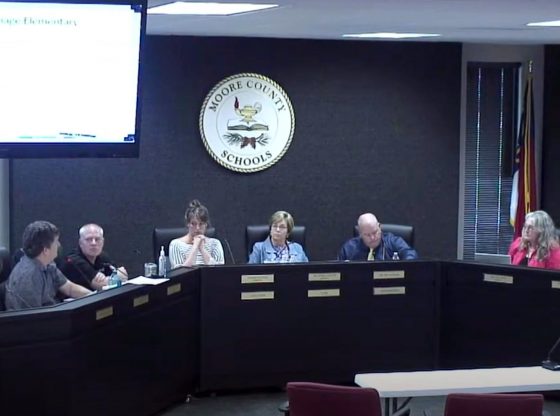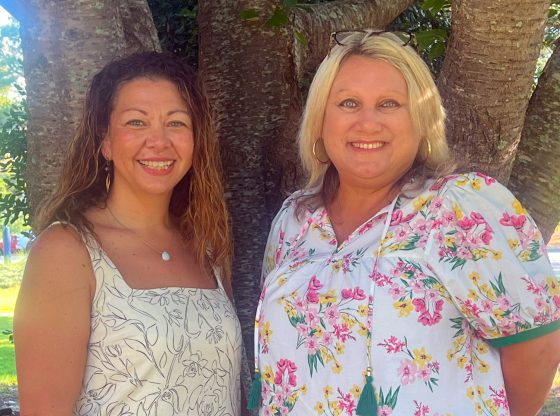Tensions were high at the recent Moore County Board of Education meeting. Board members discussed new and long withstanding issues, including the water quality at Carthage Elementary, the involvement of homeschool students in extracurricular activities, and the 2025-2026 budget on Monday, June 30.
Water Testing for Moore County Public Schools
Board member David Hensley brought a heavily debated topic to the table in an agenda item titled “Carthage Water: Action and Certainty after Years of Inaction as Requested by Board Member Hensley.”
According to Hensley, after reviewing the recent construction report, he accounts that officials with Moore County Schools (MCS) allegedly allowed staff and students at Carthage Elementary to drink discolored water for more than six years despite knowing about the issue.
Although filters were installed to remove sediment, no comprehensive water testing was conducted until last month except for routine lead tests. The district instead relied on water quality results from the municipal treatment plant.
“It bothered me that the central office was buying drinking water for themselves but having the faculty, staff, and students at Carthage Elementary drink brown water, as characterized by [former Principal Warren]—those are not my words; those are her words,” explained Hensley.
He reports that this has been a known, ongoing issue for at least six years and has come up in every campaign and election.
“I decided to take unilateral action on the water at Carthage Elementary,” announced Hensley. “No more should students, faculty, and staff be drinking untested water. I met with some elected officials in Moore County at the state level, and we unilaterally decided to take the following actions.”
In response, the Moore County Health Department is asserting the authority to conduct annual water testing on every public school campus, with results made publicly available.
State officials also plan to thoroughly test the Carthage Elementary water system, including for PFAS “forever chemicals.” Legislation is expected to be introduced in the next General Assembly session that would mandate annual testing and public reporting of water quality at all public schools in North Carolina.
“I do want to recommend and remind everybody that we would never send a child to a school where the water is unsafe, and I trust Ms. Purvis because she is a mother and a grandmother, and she is just on the same page with that; she cares about our students as our central office does,” said Board Chair Dr. Robin Calcutt. “We would never, ever send a child to a school that has unsafe water. They are continually testing the water, and there are filters on our water fountains. We’re all here to make sure our students have a safe school, and I’m looking forward to a new Carthage Elementary School.”
Increases Made to the Budget
Board members reviewed the amended budget resolution for the fourth quarter of FY 2024–25 and the continuing resolution for FY 2025–26.
Mrs. Edmonds presented the Continuing Budget Resolution for Fiscal Year 2025-2026, which totals $189.6 million.
During the discussion, Hensley questioned the sharp increase in school system funding over the past four years. He noted that in the 2020–21 school year, the budget stood at $120 million, representing a nearly 58% increase to the current $190 million despite minimal changes in student enrollment.
“Our enrollment has gone up maybe 100 students, maybe 200 students—and that’s not per year, that’s in total,” said Hensley. “My question as a board member, and I’m not looking for an answer today, is where did this extra $60 million a year go?”
Hensley’s concern centered on the alleged mismatch between rising expenditures and relatively unchanged operational demands. He argued that with static enrollment, small employee raises, and no evidence of a significant expansion in staffing, the nearly $70 million increase in annual funding warrants deeper scrutiny.
Board member Steve Johnson agreed and suggested that rising benefits and retirement costs may be a contributing factor.
Hensley questioned whether spending had shifted away from personnel toward other costs, such as technology purchases, without sufficient board oversight.
Calcutt attempted to move the meeting forward, but Hensley pressed the issue.
“Dr. Locklair, do you have a notional answer?” Hensley asked Dr. Tim Locklair, superintendent.
“I don’t have a response unless I was looking at that information and doing a comparative analysis from there to here,” said Locklair. “We do know everything costs more than it did then.”
A motion was made to approve the continuing budget resolution as presented, and the motion passed unanimously.
Debate Over Homeschool Students and Public Extracurriculars
In a presentation titled “Motion to Ensure Home School Families Have Access to MCS Extracurricular Activities,” Hensley proposed that families who homeschool should have access to extracurriculars provided by the school system. He hoped to give a short presentation to the Board.
According to Hensley, senior school leadership, “to include the superintendent and all but one school board member,” have stated their respect and support for all educational choices.
“Nothing in the MCS Mission Statement states that we service MCS students exclusively. To the contrary, programs such as Blend+Ed show that we ‘reach across the aisle’ to be inclusive,” read Hensley. “Home school children residing within Moore County will be allowed full participation in extra-curricular activities in the grade and school to which they would be assigned if attending MCS. The home school children will pay the same fees as MCS students.”
Hensley pointed out that homeschool families pay taxes to all MCS funding sources yet receive no educational benefits from their taxes. He also noted that it’s beneficial to all students involved, increases diversity in activities, and is overall good for the communities served by MCS.
When he requested to share his presentation, Calcutt instead said it would be referred to the Policy Committee and not discussed publicly at this meeting.
Hensley, however, said that he wanted this discussion to be heard publicly and challenged the referral.
When attorney Richard Schwartz told Calcutt that the referral could be challenged, board member Dr. Amy Dahl asked, “Is that discussable?” and Schwartz informed Dahl that it was not—the delay had to be allowed to be challenged.
Board member Pauline Bruno made the second appeal to hear Hensley’s presentation, and Hensley was allowed five minutes to speak.
Hensley pointed out that though he went through the proper channels and was granted permission to give his presentation, it was removed from the agenda.
“This came about because of a situation which occurred within the last month of the central office sending out an email kicking all the homeschool people out of the all-county band,” explained Hensley. “So, I wanted it—and Ms. Bruno seconded this—on the agenda for the Board members to … take the temperature of this situation. Then the policy committee goes in and develops the policy.”
Hensley reiterated that he wanted the discussion to happen publicly for transparency.
The presentation was not given during this time but was available online. The document reads:
*With the Innovative High School, MCS will gain 400 students worth of student extracurricular activities, as extracurricular activities are not available to IHS students
*Funding for Extracurricular Activities – Will pay same student fees – When IHS comes online, 200 students MCS receives funding, but we do not teach and provide few services
*$2,565,200 million per year windfall
“At this time it is my belief that with the monumental task in front of us with your proposal, to consider policy, to consider policy, to consider funding, that this is your plan, it’s not the plan of the Board, and that I refer it to the committee,” said Calcutt. “That is our process and procedure. You’re welcome to come to the committee and share it there.”
~Article by Sandhills Sentinel Assistant Editor Abegail Murphy. Abegail has been writing for Sandhills Sentinel since 2021.
To sign up for the free Sandhills Sentinel breaking news and weekly e-newsletter, please click here.
*The featured photo of the partial school board is a screenshot taken from the meeting video.


















